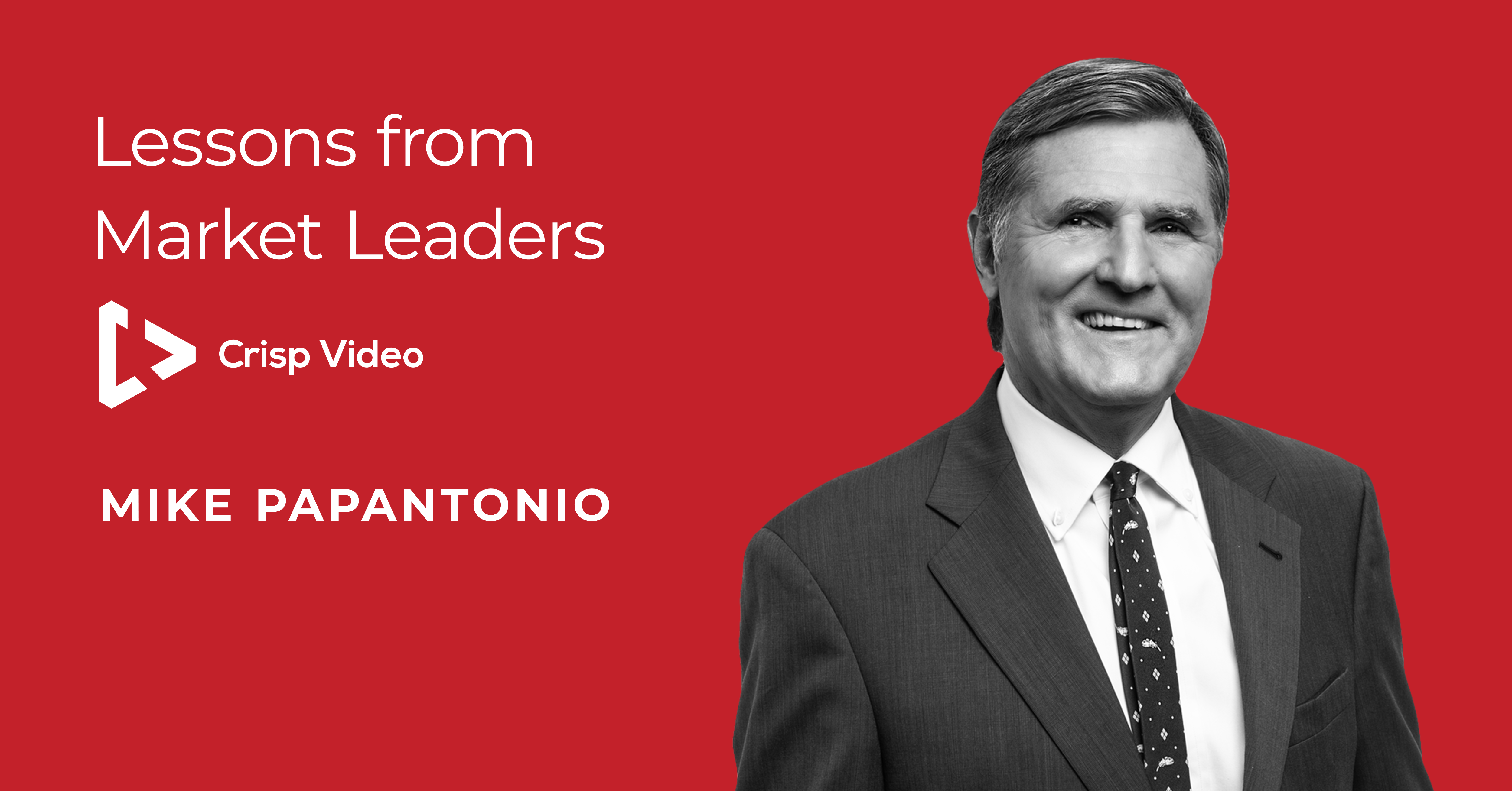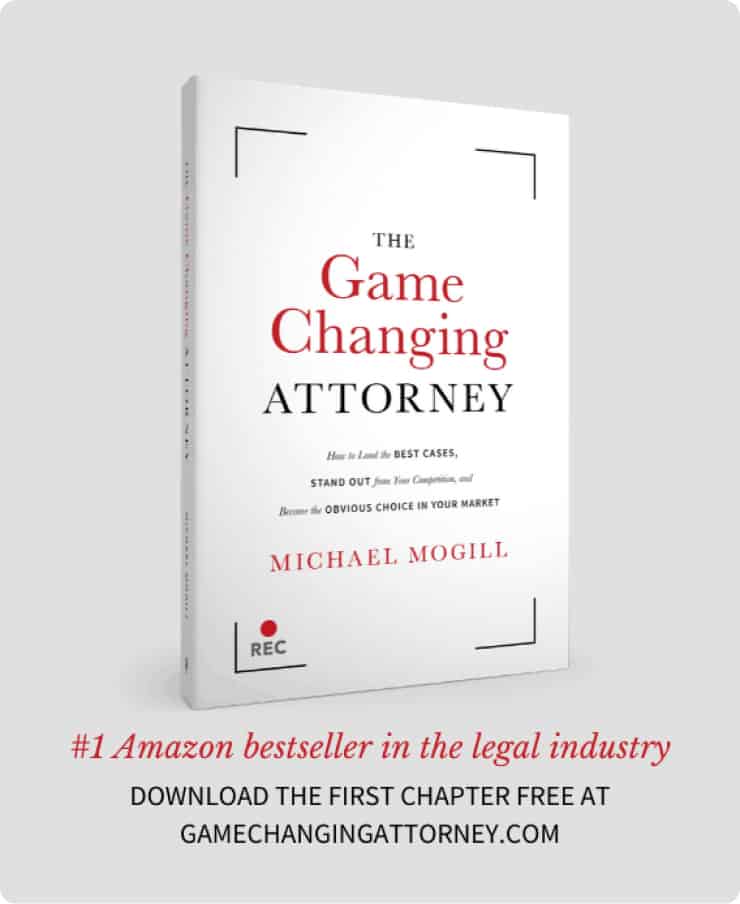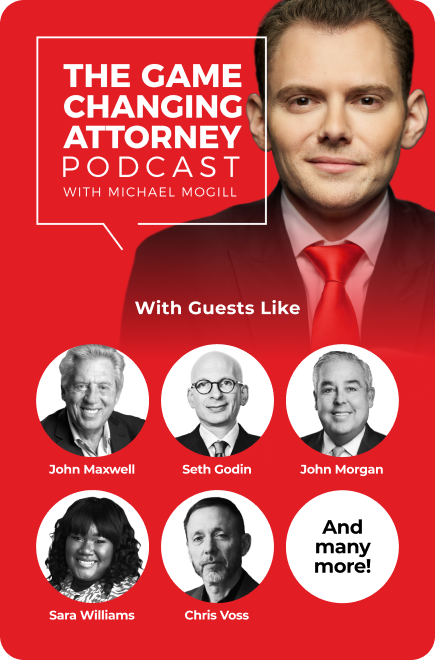In our quest to provide law firm advice to attorneys across the nation, we recently aired another episode of The Game Changing Attorney Podcast. Michael Mogill was joined by legendary trial attorney, television and radio host, best-selling author, progressive activist, and senior partner at Levin Papantonio: Mike Papantonio. Also known as America’s Lawyer, Mike has built an unmatched reputation, landed himself a spot in the Trial Lawyer Hall of Fame, and developed his career further into radio and television.
The catalyst that fuels Mike’s ferocity in the courtroom is his childhood. Growing up, Mike moved around through 8 different families across the state of Florida. Each family was supported by blue collar workers at the bottom of the socioeconomic ladder, but they graciously took him into their homes.
Mike explains that these experiences molded him into the person he is today — ready to face bullies and take care of the type of people who made him who he is today.
Later in life, as an experienced trial lawyer, Mike famously tore down chemical giant DuPont for poisoning people with cancer-causing C8 toxins. This resulted in several multi-million dollar settlements.
His radio show, Ring of Fire, has been broadcasting hot legal topics for 15 years. His TV career has evolved over time, from guest appearances to documentaries and even his own international program, America’s Lawyer.
Mike is an unabashed disruptor in the industry, and we’re recapping the insightful legal marketing and law firm advice he shared with us during his interview so that you can implement it into your own practice.
Five Lessons from America’s Lawyer:
- Push boundaries and challenge the status quo.
- Fear of rejection is dangerous.
- You can’t just build a brand with advertising.
- Preserve your quality of life.
- Remember that your work matters.
1. Push Boundaries and Challenge the Status Quo
Mike clarifies early on in our conversation that he is always true to himself. His upbringing played a large role in that. He makes a point to say that trial lawyers need to be able to get angry, to go from zero to 100 in two seconds, fueled by their genuine passion.
He recalls an example of this from when he was young, confronting older mass tort lawyers who prioritized themselves over their clients’ best interests.
“I remember grabbing the mic — I was a kid, but I remember grabbing the mic and saying, ‘Mister, I don’t even know who you are, but you are not going to be involved with my cases.’”
Out of this came the impetus for Mass Torts Made Perfect and prioritizing taking care of the consumer like never before.
Mike has always been one to push back — an ongoing element of who he is and what he does. He does things differently, which stems from his dissatisfaction with the status quo.
Mike says that progress is made by those willing to be disruptive and color outside the lines. That you can’t just do things the way the generation before you did, because they weren’t necessarily right. People get too comfortable in their ways, so when you’re innovative, it takes people out of their comfort zone. It’s not easy, but it needs to be done.
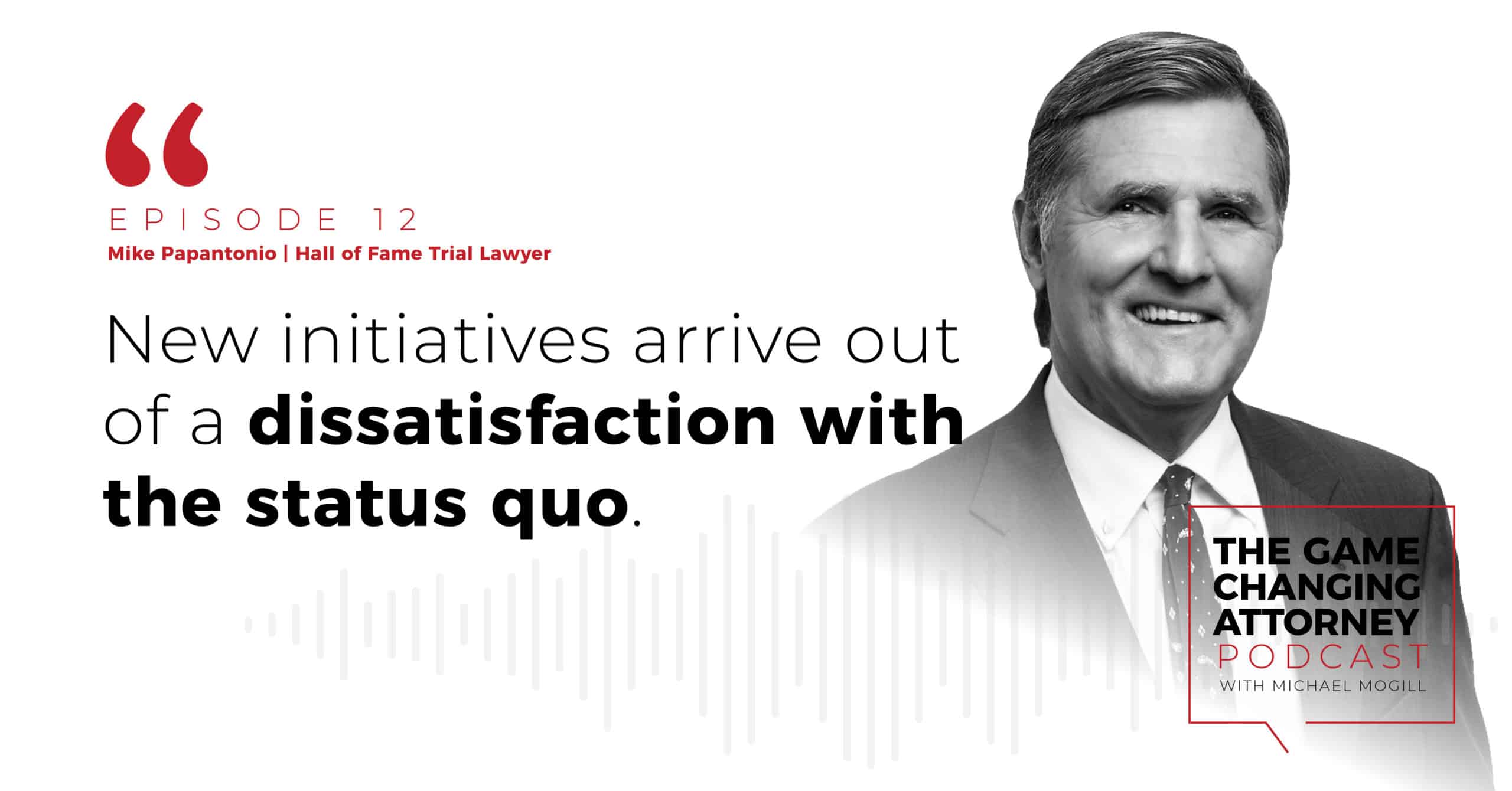
This mindset goes hand in hand with Mike’s next point.
2. Fear of Rejection Is Dangerous
When Mike was in college at the University of Florida (where, incidentally, John Morgan was his roommate), he paid for school by selling books door-to-door during the summer. He uses this anecdote to explain how he learned about rejection, and how powerful embracing rejection can be.
Then, while writing In Search of Atticus Finch as a young lawyer early in his career, Mike sent out a series of questionnaires across the country for research. The response was remarkable. Even though Mike was not yet known in the legal industry, scores of attorneys took the time to respond to him, and his findings were astonishing. He learned that many other lawyers feared rejection.
“I’m not afraid that somebody is going to be critical of what I do. I’m not afraid of failure. I’m not fearful of rejection.”
You might fail. You might fall flat on your face. But more often than not, you won’t. Even if you do, you just get back up and try something new.
Mike says you have to be totally willing to jump in. He suggests to start by collaborating with lawyers in other markets. Ask yourself, “Who are the people I don’t know, but would like to meet, because they do great things?”
When you see an opportunity to contribute to a project that another attorney has started and want to get involved, just give them a call and tell them exactly that. It’s important to have alliances and to work on initiatives together. Many attorneys are not doing this because they fear the possibility of being rejected. Mike pushed past this early on, and still practices pushing the boundaries of rejection now.
It’s important to push yourself out of that comfort zone, because fear of rejection is a dangerous thing, especially for a lawyer.
3. You Can’t Just Build a Brand with Advertising
Many attorneys hear the word “brand” and think that it sounds nice, but they’re not interested because they don’t think it can be measured. Mike disagrees. His law firm advice is to understand that branding is essential. His brand is built on a variety of ideas and practices — all of which can be measured by the success his firm has as a result.
Mike doesn’t limit himself to billboards or TV commercials. He emphasizes that you cannot just brand with advertising, as it’s a very small part of the totality that you are. And he is the perfect testament to that. If you want to be a creative, visionary, progressive firm, you must go deeper.
“The brand has to be a comprehensive picture of what it is that you really stand for.”
What is your mission statement? Clear messaging allows your audience to better understand your firm.
Mike makes it known that he works outside of the norm, he’s always on the cutting edge, and that he prioritizes client needs first and foremost. He stands by the idea that if anyone comes away from an experience at his firm without feeling like they are exactly where they need to be, something is wrong — and he tells his lawyers to leave money on the table before they harm a relationship. These ideas are the heart of his brand.
What channels can you utilize to spread this message? Using a multi-channel legal marketing approach is essential, and Mike does this better than anyone. He’s utilized radio, podcast, TV commercials and TV shows, webinars, books, documentaries, and countless other valuable opportunities to put his vision out there.
Where you create energy, people pay attention.
4. Preserve Your Quality of Life
Mike has a lot going on. How does he juggle everything? Here is his advice for law firm owners:
“Plan well.”
Know ahead of time what needs to get done, and prioritize accordingly.
“Keep a schedule.”
Organize your time and stay on track. This is hard to do alone, so Mike has a team of people that he works with to keep him in check.
“Surround yourself with the right people”
The routine and discipline is important— but it’s nearly impossible to do it all on your own.The team Mike works with, his friends, and his family are all people who support and encourage him to get it done.
He surrounds himself with people who share the same vision.
Lastly, within all this, Mike drives it home: you must preserve your quality of life. You cannot neglect your loved ones. You don’t wear the same hat when you’re in the courtroom as the one you wear at home.
The people around you support your vision, goals, and endeavors — so you must support them, too.
5. Remember that Your Work Matters
What continues to keep Mike engaged and pressing forward?
“What I’m doing matters.”
Pushing the tobacco industry, the opioid industry, and DuPont into a corner when they were killing people — that work was important. Mike asks himself, “If I didn’t do it, would anyone else have done it?” This keeps him motivated.
On top of that, the younger generation of lawyers inspire him. The young lawyers from his law firm handled the BP oil spill case. He loves to work with younger lawyers that are hungry to do good for the world. They buy into the idea, and you should too, that what they do really matters.
He wants to help these young attorneys build a legacy so that they can tell their grandchildren about the changes they made to better the world.
Final Thoughts
Being a game changer, to Mike, is always trying to wake up with another idea — never being satisfied or thinking that he’s done enough.
His closing words of advice for law firm owners are a reminder that being too comfortable is a very dangerous thing.
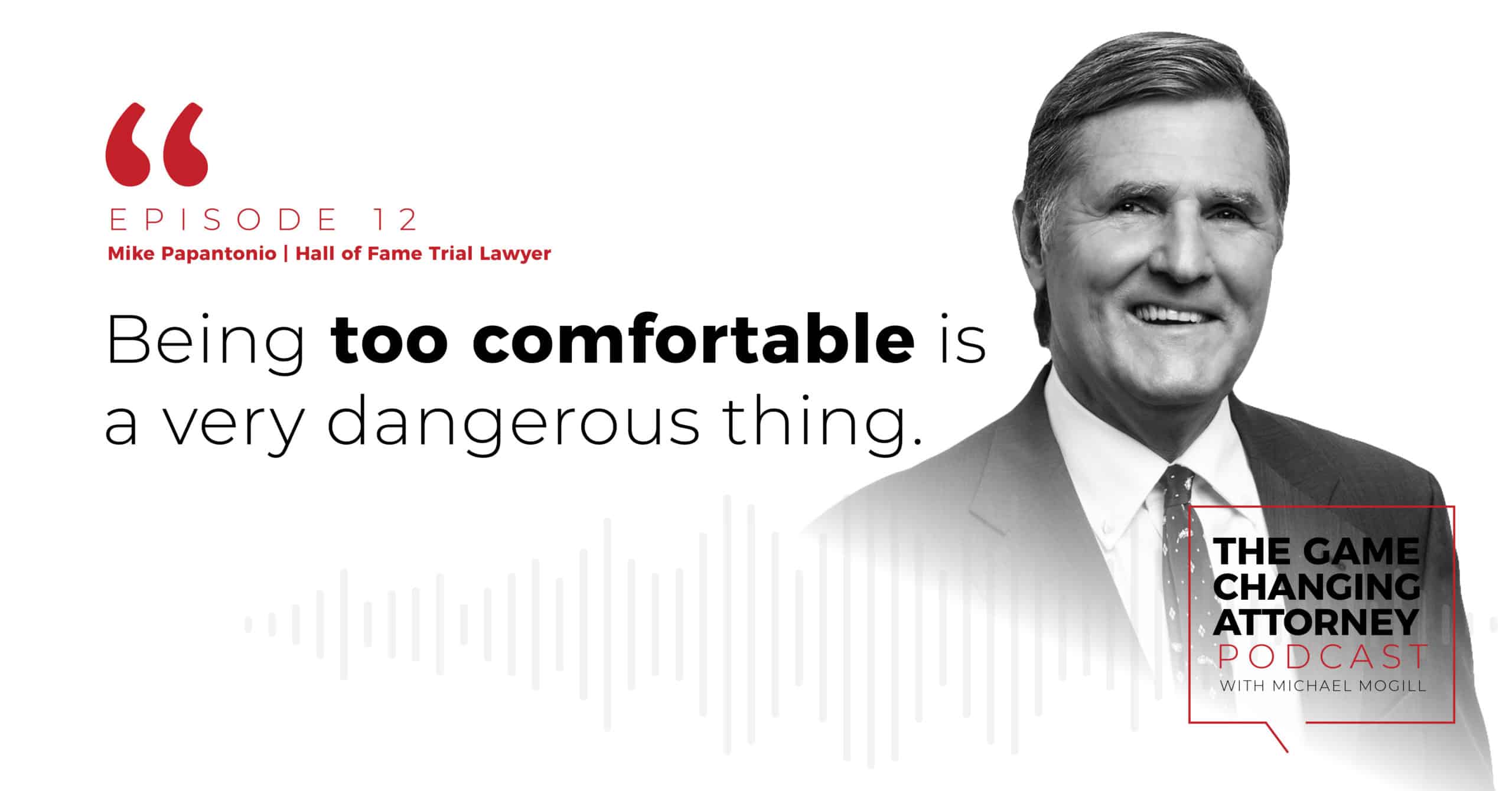
If you want to hear Mike Papantonio’s mind at work, or if you’d like to hear from other experts we’ve featured on the show, you can listen and download this episode and many more of The Game Changing Attorney Podcast for FREE on Spotify, Apple Podcasts, and the official podcast website.
